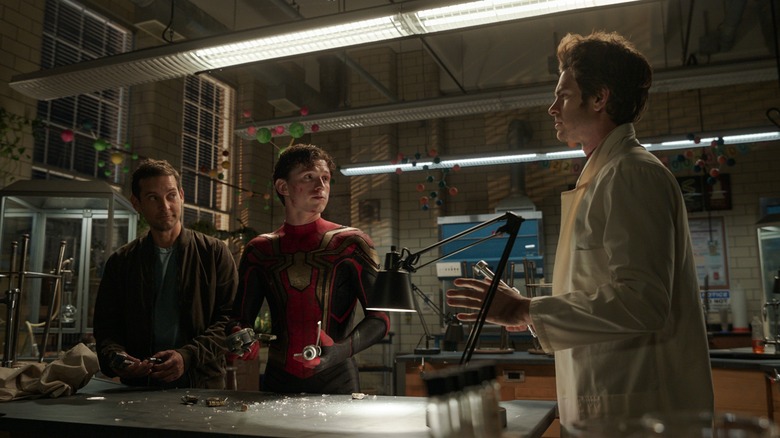Spider-Man: No Way Home Made $610 Million In Profits – Let's Talk About What That Means
At this point, even people who don't regularly follow movie news or the box office are probably well aware that "Spider-Man: No Way Home" made a ridiculous amount of money. So much so that it now ranks as one of the highest-grossing movies in history, sitting at just shy of $1.9 billion worldwide. That means the folks at Sony Pictures made a boatload of money. But just how much did they make from the latest Marvel Comics adaptation starring Tom Holland as the beloved superhero? We have an answer, or at least one that gets is in the ballpark.
In a recent report from Deadline, it's mentioned that Sony made an estimated $610 million in profit all told from "No Way Home." Mind you, that is not just box office, but when all ancillary revenue streams are accounted for, such as home video, streaming, Blu-ray sales, cable rights, etc. On the one hand, that is a huge sum of money that any gigantic corporation would absolutely love to have from a single, large investment. Given the movie's estimated $200 million budget, even when coupled with marketing costs, that is one hell of a profit margin. But on the other side of the table, this number reveals just how much money it takes to actually make a lot of money with a blockbuster film. The movie business, it turns out, is complicated.
A gigantic windfall of cash
The first big thing to focus on here is yeah, holy s***, that is a lot of money. Movie studios are gigantic concerns with many moving parts but the fact that one movie can end up producing a profit north of $600 million speaks to the power of just why blockbusters are so important. The other thing to remember though is that Sony is currently co-producing these standalone "Spider-Man" films with Disney/Marvel Studios. Per their contract, Disney co-finances 25% of the films and, as a result, gets 25% of the profits. So that $610 million figure is going to be split, with Disney taking around $152 million of that profit.
Yes, that is a gigantic chunk but it is extremely tough to imagine that "No Way Home" would have made nearly this much money had it not been attached to the MCU. So, even though that gigantic pile of cash has to be divided up, the actual amount that Sony is going to walk away with in the end is almost certainly more than they would have otherwise. Just look at "The Amazing Spider-Man 2" finishing with $708 million back in 2014. Not a bad result but did the studio come home with a gigantic pile of cash for that one? Probably not.
Tom Holland's big payday
One thing that remains a bit nebulous, even following Sony's recent presentation at CinemaCon, is what the future of Holland as Peter Parker looks like. We've heard that the studio has plans for more "Spider-Man" movies but Holland, for his part, has remind a bit noncommittal about his future. The prevailing theory is that Holland is going to hold out for a new, very rich contract as a result of just how much money "No Way Home" made. Sony, meanwhile, has but one option left in front of them: pay the man.
At this point, they can't just let Holland go. He is far too valuable to the company's bottom line. So, whatever needs to be worked out between the actor, the brass at Sony, and the folks at Marvel Studios, just do it. Back up a truck full of cash and give the man a sweetheart contract with some percentage of future profits and call it a day. The best thing to do with a good chunk of that $610 million would be to secure many hundreds of millions of dollars for the future by ensuring that Holland is happy to stay in the Spidey suit for the foreseeable future. All of this to say, one of Hollywood's top young actors is probably about to get a payday for the ages.
A window into the economics of blockbusters
One of the biggest takeaways here is that this number put together by Deadline, rough though it may be, provides a window into the economics of the movie business as it currently exists. One might look at that $1.9 billion box office figure and assume that Sony now would easily have a billion dollars or more sitting in its bank account. That's not how things work though. While I am no expert on the topic and Hollywood studio accounting is famously sketchy, there are some things we can glean from this using some rough math we have available.
For one, a rule of thumb is that a studio will double a budget for marketing. So, a $200 million budget can easily become $400 million in total expenses before anyone makes a dime. Looking at the box office and how that's divided up, another rule of thumb is that studios will generally see about half of what is earned at the box office (though in some markets such as China it is far less, about 25%). With that in mind, a $1.9 billion box office total, at best, means $950 million or so, at very best, getting back to the studio. From that, around $400 million (very roughly) would need to be recouped before any profit can be counted.
Now, imagine what this looks like for a big movie that doesn't make nearly as much at the box office. Suddenly, it becomes clear why "Black Widow" ($379 million worldwide), was viewed as such a disappointment, and why Scarlett Johansson probably had every reason in the world to be upset about the movie's simultaneous debut on Disney+ last summer. Hence, the lawsuit. The economics of big movies in a market that doesn't have a huge home video market any longer are tough to navigate. If a studio can make this much money on the biggest of big hits, imagine how much they can lose on a big flop? It's not hard to see why studios like to play it safe and have some form of relative guarantee when it comes to big-budget films.



